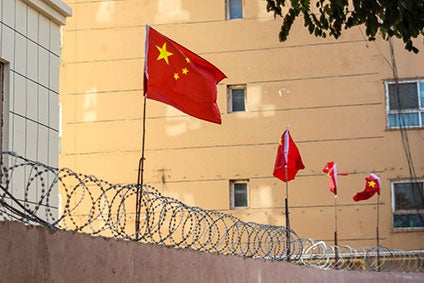
The report by non-profit organisation C4ADS, which focuses on reporting global conflict and security issues, notes the Chinese government is undertaking a concerted drive to industrialise the Xinjiang Uyghur Autonomous Region (XUAR), which has led to more corporations establishing manufacturing operations there. Between 2020 and 2021, the number of manufacturing companies established in Xinjiang grew by 19%. On a ten-year basis, it’s a growth of 199%.
While the number of apparel and textile companies that have been established in Xinjiang has gradually fallen from a 2016-high of 870 companies to 439 in 2021, it is 161% higher than the number of apparel and textile companies in the region since 2011.
The report, titled ‘Shifting Gears: The Rise of Industrial Transfer into the Xinjiang Uyghur Autonomous Region’, notes the transfer of industry to the Xinjiang region allows enterprises to take advantage of cheap labour costs and retain the lower ends of Chinese supply chains.
The most significant growth has been in labour-intensive manufacturing, such as textile production and food processing. These industries’ high demand for low-skilled labour means they present a higher risk of employing forced labour, report authors note.
The Chinese government is looking at leveraging industrial parks to implement its economic and cultural objectives in the Xinjiang Uyghur Autonomous Region. The report offers a case study into two such industrial parks; The Yining Textile Industry Zone in Ghulja, and Nantong Youmian Haochen Textil Co, which it says have been built as “pairing programme initiatives [and] work as vectors for the transfer of companies from their paired region to XUAR.”
Neither, it says, publish information about where they source their textiles, but the close relationship between them, Xinjiang Dasheng Weaving Co Ltd, and the Yining County Weaving Industrial Park, “creates a heightened risk that they may be sourcing materials from XUAR.”

US Tariffs are shifting - will you react or anticipate?
Don’t let policy changes catch you off guard. Stay proactive with real-time data and expert analysis.
By GlobalDataThe report adds the company’s role in promoting industrial transfer in an industrial park with documented forced labour issues demonstrates how Chinese businesses support repressive Chinese government policy outside of strict sourcing relationships.
It says: “This is only one example of the twenty Nantong-based companies that have moved into the Yining County Weaving Industrial Park, which itself is a single case of a pattern of industrialisation and mass transfer via industrial park that is taking place across the Uyghur region.”
The Yining County Weaving Industrial Park could not be reached prior to publication and the Xinjiang Dasheng Weaving Co Ltd had not responded to Just Style’s request for comment at the time of going to press.
The report continues: “The human rights abuses occurring within the Xinjiang Uyghur Autonomous Region cannot be addressed in isolation. The highest levels of the Chinese government are developing policies of repression and forced assimilation, which are being implemented, in part, by the transfer of east coast manufacturing into XUAR. This means that Chinese supply chains and corporate activity more broadly are becoming ever more entangled with oppression in Xinjiang, amid mounting pressure on international companies to extricate their supply chains from the region.”
“In the face of both moral and legal obligations to stop sourcing products from XUAR or otherwise work with companies that support oppression in the region, importers and global companies must redouble their efforts to trace their supply chains. Doing so will require a more comprehensive understanding of the ways state and private corporations are complicit in China’s ongoing campaign of human rights abuse against Uyghurs. As C4ADS’ analysis demonstrates, stakeholders can more easily trace these ties by understanding the pathways through which industry in the Uyghur region is connected to eastern China. This tracing can be done through the relatively straightforward method of identifying XUAR-based members of corporate groups headquartered in eastern China.”
On 21 June, the US government implemented its Uyghur Forced Labour Prevention Act (UFLPA). Should there be suspicion that garments, not necessarily originating from Xinjiang, but containing inputs that have originated in Xinjiang, the goods can be detained by CBP under the act and subject to further investigation. With 20% of the world’s cotton coming from Xinjiang, it can be reasonably assumed that concern is growing among US clothing brands and retailers who nevertheless, have expressed support for the policy.
A recent webinar hosted by Sourcemap explained why brands should harness supply chain mapping capabilities on the belief that governments across the world will follow in the footsteps of the US with its Uyghur Forced Labour Prevention Act.



